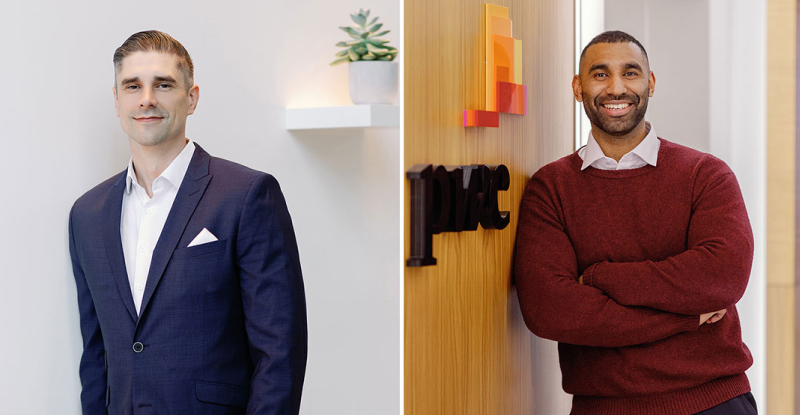
Harnessing the power of a multi-generational workforce
Discussions about equity, diversity, and inclusion often focus on race, gender, or sexual orientation, and understandably so. But another factor that needs to be considered is age, particularly as there are now five generations in the workforce. What does generational diversity mean for businesses? What does it mean for workers? How can we overcome differences to facilitate collaboration? Are the differences even as significant as we might think?
Researcher, educator, and author Olivia McIvor explores these questions in her book Four Generations One Workplace: Sharing in the Information Age (soon to be reissued as Five Generations One Workplace). During her more than 30 years of work in the field of human resources, Olivia has advocated for social change at the organizational level and helped leaders across North America maximize human potential.
Olivia spoke with us about how businesses can tap into the potential and wisdom of each generation to enhance performance, build collaborative teams, and harness the power of diversity.
There have always been multiple generations in the workplace, so what’s different about the current landscape?
Olivia: Five is more of a recent phenomenon, as it used to be standard for people to retire at 65. Now that Canada doesn’t have mandatory retirement and people are living longer, healthier lives, many are continuing to work, whether for social or economic reasons. So I tend to say it’s the first time in history that we have five generations in the workplace at the same time.
You’re currently updating your book to include a generation you’ve dubbed “Generation-Mi.” Did you choose this name because these youngest workers are similar to the millennials before them?
Olivia: They do share many common qualities and characteristics with their Gen-M (millennial) cousins, but they have distinct trademarks as well, which is why I gave this cohort the Mi title. The “i” refers to the Internet, global technology, handheld devices, apps, and artificial intelligence, all of which surrounds them like a halo, influencing their choices, decisions, and actions.
Surely global technology is a huge factor for millennials as well. How is it different for Gen-Mi?
Olivia: I would say that Gen-M grew up with technology, whereas Gen-Mi grew into technology symbiotically. Inclusivity is another important aspect to the “i,” as Gen-Mi choose to live and thrive in an inclusive and transparent world where they know they can make a difference. At the same time, this cohort is realistic and practical, and many of their choices signal a return to some of the traditions of their great-grandparents.
That’s interesting, because the pre-boomer and boomer generations seem so far apart from Gen-Mi in terms of formative events. In your work, you refer to these events as “generational imprints”—can you expand on this concept and explain how imprints correlate to specific generational traits?
Olivia: By imprints, I’m referring to the shared life experiences—the events, heroes, innovations, challenges, etc.—during adolescence that help to shape a generation’s view of work and of the world. Often it’s a seminal or one-time event or phenomenon that individuals witness or experience, such as the emergence of rock ‘n’ roll, the events of 9/11, the invention of the smartphone, or the global pandemic—just to name a few. It’s something that changes the world, or our perception of it, forever. Generations aren’t defined as much by when they’re born as they are by these kinds of shared experiences.
And, of course, each individual is unique, but most of us share certain characteristics with our generation as a whole because of common imprints. These imprints influence how we view the world, and our view of the world influences our behaviour—this includes what motivates us, intrinsically and extrinsically. In some cases, these influences are unconscious.
When you talk about these imprints in your work, are you primarily looking through a North American lens?
Olivia: The research does have a North American focus. Having said that, I’ve been learning through recent workshops that participants who are new to Canada tend to be one generation up from their Canadian counterparts. So someone from overseas who fits in the Gen-X age category might actually have many of the traits of a boomer—or even a pre-boomer—depending on their culture. When I say this, it always resonates with people in the room. But there are still some commonalities—generally speaking, individuals from countries that are more advanced in terms of, say, technology, will have more similar imprints. And everyone around the globe is imprinted in their adolescence—the imprints may look different, but the impact seems very similar.
Table: Understanding the five generations in the workforce
| GENERATION | FIVE IMPRINTS | THREE COMMON TRAITS | WORK CREDO | HOW BEST TO ENGAGE WITH THEM |
|---|---|---|---|---|
|
Pre-Boomer Age 76+ Born < 1945 |
|
|
"I am my work." | Respect them |
|
Baby Boomer Age 57-75 Born 1946-1964 |
|
|
"I live to work." | Value them |
|
Gen X Age 41-56 Born 1965-1980 |
|
|
"I work to live." | Invest in them |
|
Millennial Age 21-40 Born 1981-1996 |
|
|
"I work to play." | Mentor them |
|
Gen-Mi Age 6-24 Born > 1997 |
|
|
"I work for purpose and security." | Mentor them |
Presumably, understanding our own imprints and those of other generations could go a long way to helping us bridge any generational gaps, particularly at work. But are the gaps even as wide as we might think?
Olivia: There are indeed significant differences, particularly in terms of how each generation prefers to develop, engage, and collaborate in the workplace. Having said that, I like to give stronger weight to what we have in common. For example, each generation wants to know that who they are, and what they do, matters. Secondly, we all want to feel safe, both psychologically and physically. And, thirdly, we all want to experience a sense of belonging—after all, we are a social species, and we want to have deeper connections with others.
Ultimately, I believe that each generation puts their very best foot forward for the circumstances in which they find themselves. It’s then up to the next generation to interpret this legacy and choose if and how they want to build on it.
So what is the biggest obstacle to understanding each other?
Olivia: It isn’t our age differences; it’s our judgments about one another—that is our biggest obstacle. We perpetuate the idea of a generation gap when we fail to have meaningful conversations with one another. The only way through this is to be curious and ask thoughtful, considerate questions—and then be willing to listen to the answers. It’s only by talking to one another that we’ll come to understand our different motivators, strengths, and communication styles.
Is this how a leader can help foster understanding in multi-generational teams—by sparking conversation?
Olivia: Yes. Leaders need to facilitate dialogue across the generations. Open dialogue is the key to improving relationships, de-escalating conflicts, and enhancing performance. If a leader wants to create a long-lasting, high-functioning, and inspired team, they need to give voice to each generation—to both their individual perspectives and their collective wisdom—and cultivate these voices for the common good of everyone in the workplace. And they need to encourage all generations to be teachers and share their knowledge.
Is that what you mean by “generational leadership”?
Olivia: Yes, but it’s more than that. A generational leader is a transformational leader. In the last decade, studies have demonstrated a strong connection between caring collegial relationships, personal engagement, and business outcomes. (See inset below.) The modern leader is a coach and mentor who empowers people to reach their full potential and thrive by encouraging them to bring their unique gifts and talents to the forefront of their work.
Generational leaders recognize that each generation brings something unique to the table, and that you have to give voice to everyone equally. They’re also aware that it’s no longer a question of how workers must adapt to their employers, but of how employers must adapt to their employees.
Related reading:
- Sigal Barsade and Olivia A. O’Neill, “Employees Who Feel Love Perform Better,” Harvard Business Review, January 13, 2014.
- Jim Harter, “U.S. Employee Engagement Holds Steady in First Half of 2021,” July 29, 2021.
- Susan Sorenson, “How Employee Engagement Drives Growth,” June 20, 2013.
- John M. Bremen, “Transforming The Great Resignation into The Great Hire,” August 2, 2021.
How can leaders ensure that each generation feels heard?
Olivia: By acting as advocates of positive persuasion. To be an effective generational leader, you have to model proactive behaviour by reaching out first and asking people what they need, how they learn, what motivates them, and how they want to be coached. And you need to listen to their answers and then apply what you’ve learned to create a tailored approach to each generation.
So you have to bake flexibility into your management style and your culture?
Olivia: Yes. You have to recognize that one size does not fit all when it comes to things like communication, benefits, feedback, recognition, development, etc. Tracks need to be unique—leaders need to provide tailored learning and growth opportunities to each individual as much as possible.
That sounds like a lot of work. What’s the risk of not putting in the effort?
Olivia: It’s true that it requires a concerted effort to build strong multi-generational teams. But businesses on a global level are seeing the effects of “the Great Resignation,”1 so now more than ever, complacency will result in failure to attract, retain, and engage all generations. In turn, that’s going to wreak havoc on diversity of thought and skills. To thrive and be resilient in this turbulent landscape of work, organizations need to be inclusive—people from every generation need community and connection. Connection, life-work balance, and skill development opportunities are the primary recruitment and retention tools right now.
In your work, you say that everyone is equally responsible for fostering collaborative relationships across the spectrum of generations, regardless of age or position. So what can each of us do to bridge the generational divide?
Olivia: As I said earlier, we need to talk to each other. And that means actively listening without judgment, being curious, and asking questions rather than making assumptions. We can show respect for others’ values and uniqueness, just as we want others to respect our own. We can discuss what we need from each other in terms of approach and support. We can practise transparency—sharing what we know and what we don’t know. And, always, we can and should practise kindness.
You’ve presented learning sessions on this topic to a variety of organizations, including CPABC. Has anything surprised you along the way?
Olivia: In the 15 years that I’ve been researching and facilitating inter-generational dialogues, the common themes haven’t changed, and that is what surprises me. Every cohort truly wants to have trusting relationships and feel appreciated, and they want you to take the time to connect, which is about giving consistent feedback and coaching. These three desires cut across all age barriers, which, in a nutshell, means each generation wants to build collaborative relationships, regardless of age or imprints. And all generations want to work in organizations that don’t just pretend to be inclusive, but really are brimming with diversity and inclusion.
We recently profiled the BC CPA candidates who made the Honour Roll on the September 2021 CFE. Is there any advice you’d like to share with them as they move forward in their careers?
Olivia: I’d say the reality is that you’re going to be, and work, with every generation throughout the course of your career—the ones in front of you and the ones coming up behind you. If you make it your motto to make everyone feel genuinely valued for their contribution, respected for their wisdom and experience, and truly heard, you’ll set yourself up for success.
I encourage you to take the time to be curious and ask thought-provoking questions. Be ready, willing, and able to stand on the shoulders of those who have been there before you and learn from them. And, most importantly, put your hand up to be a mentor to others, regardless of age, as you also have something to offer. Be patient, be kind—your turn will come to make changes once you have a strong foundation to stand on.
On a related note, do you have any advice for the older generations working with these younger colleagues?
Olivia: I see it as quite inevitable that as generational power shifts and a greater emphasis is placed on individual competency than on age or tenure, individuals will end up at odds due to their age differences. So to older workers, I say be honest and ask for what you need in order to stay engaged in your work. Be open-minded to new ideas and new ways of doing things, even when it might be difficult. Be encouraging, rather than taking a defensive position. Acknowledge the challenges that the younger generations face at work by choosing to support them rather than suppress them.
Additionally, be proud of your accomplishments and generously offer up your advice and experience freely, without expectations. Take on a mentorship role and share your knowledge about the company culture and history—it’s invaluable. Lastly, think about the legacy you’ll be leaving behind as your generation eventually exits the workplace, and ask yourself: “What do I want to pass forward?”
Michelle McRae is the managing editor of CPABC in Focus. This article was originally published in the January/February 2022 issue of CPABC in Focus.



